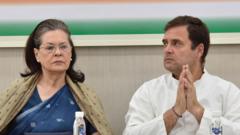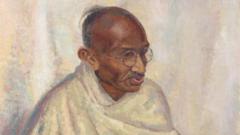The Enforcement Directorate has charged key figures in India's Congress party, including Sonia and Rahul Gandhi, with money laundering related to the acquisition of the National Herald newspaper, prompting widespread protests and allegations of political vendetta.
Gandhi Family Faces Money Laundering Charges in Political Firestorm

Gandhi Family Faces Money Laundering Charges in Political Firestorm
Sonia and Rahul Gandhi are accused of financial impropriety, igniting protests from the opposition Congress party.
India's opposition Congress party has declared plans for nationwide protests in response to charges levied against prominent leaders Sonia and Rahul Gandhi by the country's Enforcement Directorate (ED). The ED's accusations assert that the Gandhis engaged in money laundering through the formation of a shell company, allegedly misappropriating assets worth over 20 billion rupees (approximately $233 million) linked to the National Herald newspaper.
Congress spokesperson Jairam Ramesh condemned the charges as "politics of vendetta and intimidation" and affirmed the party's resolve to fight back against what it describes as government overreach. The Gandhi family, who have consistently denied any wrongdoing, have yet to publicly comment on the recent allegations.
The investigation, initially triggered by a private complaint from Bharatiya Janata Party (BJP) member Subramanian Swamy in 2021, suggests the possibility that party funds were utilized to acquire Associated Journals Limited (AJL), which formerly published the now-defunct National Herald, and to illegally obtain properties valued in the millions.
The Congress maintains that its acquisition of AJL was a historic move to preserve the newspaper and highlights that the party loaned over 900 million rupees to the publisher over the years. Notably, AJL became debt-free in 2010 after swapping its debt for equity, resulting in the establishment of a new entity, Young Indian, which Congress claims operates as a non-profit entity without any dividends for shareholders or directors.
Currently, Sonia and Rahul Gandhi each hold a 38% stake in Young Indian, which, along with other Congress officials, controls the remaining shares. Last week, the ED announced that Young Indian acquired properties worth 20 billion rupees for a mere 5 million, sparking renewed scrutiny of the firm’s valuation practices.
In addition to the charges, the agency has moved to seize assets totaling 6.6 billion rupees associated with Young Indian across major Indian cities including Delhi and Mumbai. The next court hearing regarding this case is scheduled for April 25.
The political climate has been tense, with opposition leaders frequently accusing Prime Minister Narendra Modi's government of using the ED as a tool against dissenters. Over the years, the agency has summoned or taken action against around 150 opposition politicians since Modi assumed office in 2014, a practice solidified by high-profile arrests, including that of former Delhi Chief Minister Arvind Kejriwal last year related to a liquor scam ahead of significant elections.
The National Herald newspaper has a storied legacy dating back to 1938, when it was founded by India's first prime minister Jawaharlal Nehru, who is also a descendant of Rahul Gandhi. Although it ceased to function in 2008 due to financial issues, the Congress acquired the paper in 2010, subsequently reviving it as a digital platform in 2017. Historically, the National Herald has been closely associated with India's independence movement, serving as a voice for Congress party ideologies throughout its history, despite its eventual financial demise.

















